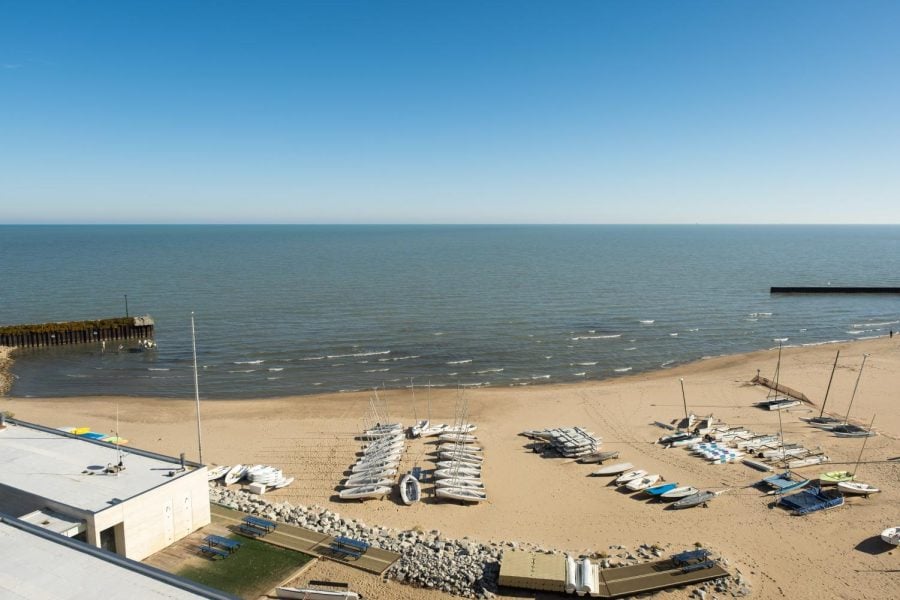Lakefront management will emphasize safety, diversity in first recruitment and training season under EFD leadership
Daily file photo by Seeger Gray
The Clark Street beach. The EFD has started recruiting lifeguards for summer 2023, prioritizing worker input and diversity in the process.
February 5, 2023
Content warning: This article contains discussions of sexual harassment and assault.
As the Evanston Fire Department begins recruiting lifeguards for the 2023 season, city officials said they are continuing to improve workplace culture among lakefront staff.
In 2021, WBEZ reported on a petition signed by more than 50 female lakefront employees alleging pervasive sexual harassment and assault from their co-workers. Several city officials resigned, including City Manager Erika Storlie and Parks and Recreation Director Lawrence Hemingway. In early 2022, the city released a report completed by an independent law firm stating city officials failed to address sexual misconduct along the lakefront.
Now, after taking over from Parks & Recreation, EFD is preparing for its first season managing the lifeguard program. This is also Lakefront Manager Tim Carter’s first full season leading recruitment efforts — last summer, he had just six weeks to prepare after his April appointment.
Because lifeguard operations will fall under the fire department’s purview this summer, Carter said recruitment efforts started earlier, on Nov. 11 at the Mayor’s Summer Youth Employment Program job fair. By the end of January, Carter said the EFD received 120 lifeguard interest forms.
EFD Chief Paul Polep said this year’s lifeguard training would feature more extensive life safety training.
“We’re trying to put our own spin on it,” Polep said. “Fire departments are held to a certain standard of professionalism, and we’re trying to put that spin on the lifeguards but still make it fun and a great learning experience.”
This year’s Lifeguard Academy, a mandatory 30- to 40-hour training program for new and returning lifeguards, will train with EFD’s surface water rescue and dive teams, Polep said. Lifeguards will also be trained to use the fire department’s multi-channel radio system, which will allow them to communicate directly with dispatchers.
Polep said he hopes the reputation of the EFD as an emergency service organization will help change the role of lifeguards and Evanston’s lakefront staff culture.
“We hold ourselves to a certain standard — the way we look, the way we train, the way we act, the way we treat the public,” he said. “I think that is going to be a culture change.”
Last year, lakefront leadership tried to implement new methods of determining leadership, such as hiring more women in leadership positions and eliminating physical training as a discipline measure, Carter and Polep said.
One of the main changes Carter made to last year’s recruitment and leadership promotion process was incorporating interviews.
Carter said this process led to an increase in women in lakefront leadership positions.
“We gave people leadership positions based on their skill level and their experience at the beach,” he said. “It didn’t matter how quick they ran or how fast they swam. Chief (Polep) and I are committed to that diversity.”
Gabby Sloane, who started working as a gate attendant at the lakefront six summers ago, said lifeguard leadership roles used to be predominantly filled by men. The scoring system determining these positions used to weigh physical tests above written ones assessing familiarity with cardiopulmonary resuscitation, first aid and training manuals.
“Since a lot of issues have been brought to light and people have been feeling more comfortable to talk about them, I think a lot of issues people have felt about unfairness towards women have gone away,” Sloane said.
Polep said, however, that he doesn’t consider the lakefront’s culture of sexual harassment and assault to be an issue with recruitment.
In previous years, lifeguards could also be punished for breaking rules by being assigned physically strenuous tasks like running or swimming long distances, a practice former lifeguards compared to hazing in the 2021 petition. Though lifeguards will still undergo physical training both during and after Lifeguard Academy, Carter and Polep emphasized that it would never be used as a disciplinary measure.
Instead, EFD might require daily in-service training, in which all lifeguards, including their supervisors, would complete a quarter-mile swim together.
“If we’re all working together as a team, we’re going to go a long way,” Polep said. “And the goal is to remain a team.”
Carter said he has bi-weekly meetings with lifeguard and beach leadership to discuss all lakefront decisions, including training protocols and emergency response plans. They will also be contributing to lakefront training manuals.
Sloane, who was appointed director of the aquatic kids camp last summer, said she’s happy with Carter’s more collaborative approach.
“(Management) has really done a great job of asking us what we want to see changed and also finding a fair way to do things in a more safe and comfortable environment,” she said.
Email: [email protected]
Twitter: @joyycee_li
Related Stories:
— Lakefront operates under new management for first summer since sexual misconduct allegations
— Evanston lakefront lifeguards to join the Fire Department under new proposal
— Law firm releases report on investigation into 2020 lakefront misconduct allegations


